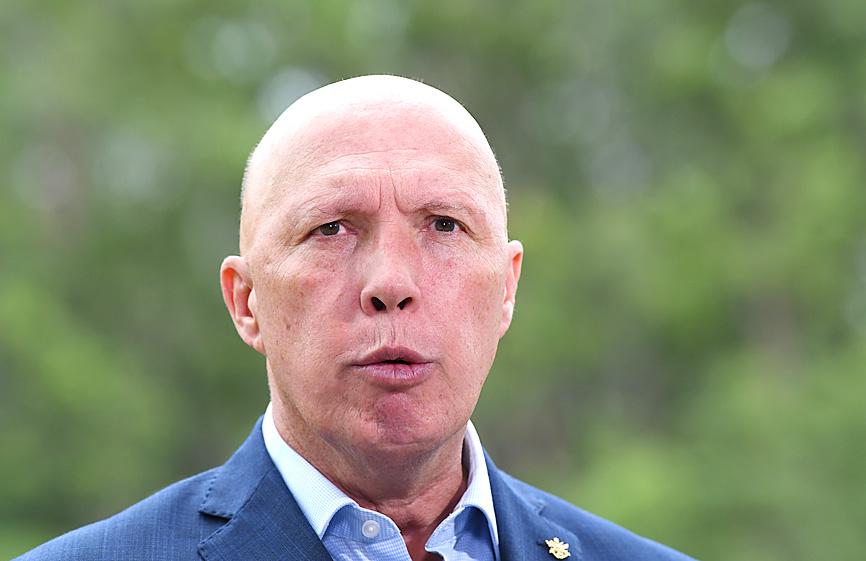The Australian government yesterday launched the Space Command, a new defense agency with echoes of the US’ Space Force that has been tasked with securing the country’s place in an “already contested” cosmos.
Australian Minister for Defence Peter Dutton said the new defense arm would be modest to start with, although he gave no detailed staffing or budget figures.
In a speech to the Australian Air Force, he said that space “will undoubtedly become a domain that takes on greater military significance in this century.”

Photo: EPA-EFE
“Space is becoming more congested and is already contested, particularly as the boundaries between competition and conflict become increasingly blurred through gray-zone activities,” he said.
Dutton positioned the Space Command as a clear counter to China and Russia’s extraterrestrial military ambitions, condemning the two nations in his speech, along with all “countries that see space as a territory for their taking, rather than one to be shared.”
The Space Command is to be led by Australian Air Vice Marshal Cath Roberts — “a self-professed science fiction buff” — who will oversee a team drawn from across the Australian military, as well as private contractors.
Dutton said that the agency would “initially be modest,” but added that Australia would need “a Space Force in the future” — a nod to the US service that was launched by then-US president Donald Trump in 2019.
The Space Command makes for close collaboration between the US and Australia in yet another domain, coming just months after the two countries signed a new military partnership, AUKUS, along with the UK.
The Australian government has been squarely focused on the military as an election looms, committing earlier this month to increase the country’s defense force to 80,000 troops by 2040.

ACTION PLAN: Taiwan would expand procurement from the US and encourage more companies to invest in the US to deepen bilateral cooperation, Lai said The government would not impose reciprocal tariffs in retaliation against US levies, President William Lai (賴清德) said yesterday, as he announced five strategies to address the issue, including pledging to increase Taiwanese companies’ investments in the US. Lai has in the past few days met with administrative and national security officials, as well as representatives from various industries, to explore countermeasures after US President Donald Trump on Wednesday last week announced a 32 percent duty on Taiwanese imports. In a video released yesterday evening, Lai said that Taiwan would not retaliate against the US with higher tariffs and Taiwanese companies’ commitments to

Intelligence agents have recorded 510,000 instances of “controversial information” being spread online by the Chinese Communist Party (CCP) so far this year, the National Security Bureau (NSB) said in a report yesterday, as it warned of artificial intelligence (AI) being employed to generate destabilizing misinformation. The bureau submitted a written report to the Legislative Yuan in preparation for National Security Bureau Director-General Tsai Ming-yen’s (蔡明彥) appearance before the Foreign Affairs and National Defense Committee today. The CCP has been using cognitive warfare to divide Taiwanese society by commenting on controversial issues such as Taiwan Semiconductor Manufacturing Co’s (TSMC, 台積電) investments in the

‘SPECIAL CHANNEL’: Taipei’s most important tasks are to stabilize industries affected by Trump’s trade tariffs and keep negotiations with Washington open, a source said National Security Council Secretary-General Joseph Wu (吳釗燮) arrived in the US for talks with US President Donald Trump’s administration, a source familiar with the matter said on Friday. Wu was leading a delegation for a meeting known as the “special channel,” the Financial Times reported earlier. It marked Trump’s first use of the channel since returning to the White House on Jan. 20. Citing a source familiar with the matter, the Financial Times reported that Minister of Foreign Affairs Lin Chia-lung (林佳龍) was also a part of the delegation. The visit came days after China concluded war games around Taiwan and amid Trump’s

HELPING HAND: The steering committee of the National Stabilization Fund is expected to hold a meeting to discuss how and when to utilize the fund to help buffer the sell-off The TAIEX plunged 2,065.87 points, or 9.7 percent, to close at 19,232.35 yesterday, the highest single-day percentage loss on record, as investors braced for US President Donald Trump’s tariffs after an extended holiday weekend. Amid the pessimistic atmosphere, 945 listed companies led by large-cap stocks — including Taiwan Semiconductor Manufacturing Co (TSMC, 台積電), Hon Hai Precision Industry Co (鴻海精密) and Largan Precision Co (大立光) — fell by the daily maximum of 10 percent at the close, Taiwan Stock Exchange data showed. The number of listed companies ending limit-down set a new record, the exchange said. The TAIEX plunged by daily maxiumu in just